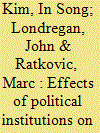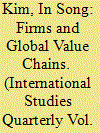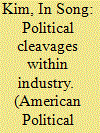| Srl | Item |
| 1 |
ID:
169319


|
|
|
|
|
| Summary/Abstract |
We present a model of political networks that integrates both the choice of trade partners (the extensive margin) and trade volumes (the intensive margin). Our model predicts that regimes secure in their survival, including democracies as well as some consolidated authoritarian regimes, will trade more on the extensive margin than vulnerable autocracies, which will block trade in products that would expand interpersonal contact among their citizens. We apply a two-stage Bayesian LASSO estimator to detailed measures of institutional features and highly disaggregated product-level trade data encompassing 131 countries over a half century. Consistent with our model, we find that (a) political institutions matter for the extensive margin of trade but not for the intensive margin and (b) the effects of political institutions on the extensive margin of trade vary across products, falling most heavily on those goods that involve extensive interpersonal contact.
|
|
|
|
|
|
|
|
|
|
|
|
|
|
|
|
| 2 |
ID:
165441


|
|
|
|
|
| Summary/Abstract |
Trade policy has become increasingly multidimensional. Current trade agreements not only address market access but also encompass rules and provisions related to flexibility of commitment, investment protection, and dispute settlement mechanisms. Yet, rigorous evidence about how interest groups evaluate each of these in relation to the others remains scarce. We develop a firm-level theoretical framework to explain how firms’ international operations affect their preferences on different trade policy measures. We experimentally evaluate preferences over multiple policy dimensions using a conjoint analysis on firms in Costa Rica. Notably, for many types of firms, the standard trade policy measures of yesteryear—tariffs and subsidies—are no longer their most important concerns. Instead, the degree of firms’ involvement in global value chains shapes their preferences. Multinational corporations care most about protection of their foreign investments. Those exporters who are not central to global supply networks most value strong dispute settlement procedures. Finally, we find that preferences over these policy dimensions are more likely to vary by firm than by industry, which calls into question the existing literature's focus on interindustry distinctions.
|
|
|
|
|
|
|
|
|
|
|
|
|
|
|
|
| 3 |
ID:
153760


|
|
|
|
|
| Summary/Abstract |
Existing political economy models explain the politics of trade policy using inter-industry differences. However, this article finds that much of the variation in U.S. applied tariff rates in fact arises within industry. I offer a theory of trade liberalization that explains how product differentiation in economic markets leads to firm-level lobbying in political markets. High levels of product differentiation eliminates the collective action problem faced by exporting firms while import-competing firms need not fear product substitution. To test this argument, I construct a new dataset on lobbying by all publicly traded manufacturing firms from reports filed under the Lobbying Disclosure Act of 1995. I find that productive exporting firms are more likely to lobby to reduce tariffs, especially when their products are sufficiently differentiated. I also find that highly differentiated products have lower tariff rates. The results challenge the common focus on industry-level lobbying for protection.
|
|
|
|
|
|
|
|
|
|
|
|
|
|
|
|